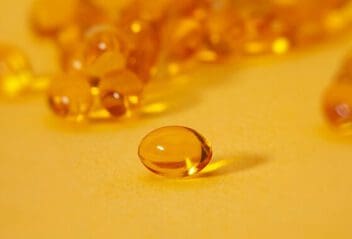MacuHealth Reviews: Do They Work or Not?
Last Updated:
Age-related macular degeneration (AMD), one of the top causes of vision loss in the United States, is a progressive condition that leads to degeneration of the macula in the eye. This is the central part of the eye that helps you to see clearly and in sharp definition. Eating specific foods or taking supplements can help to slow the progression of AMD.
Table of Contents

MacuHealth dietary supplements are designed to help you maintain your sharp vision in a healthy manner. These products contain specific nutrients found to support eye health and potentially reduce the risk for AMD.
Depending on the type and its progression, age-related macular degeneration can often be slowed through a proper diet and supplements. Medications and laser treatments can also help to slow its progression.
MacuHealth Products
Your vision is sharpest in the center of your retina in the macula. This is also where color is processed. The macular pigment can be maximized through the introduction of specific nutrients into your body. This can be done through supplementation.
MacuHealth supplements can help to improve your vision and protect your macula from disease such as AMD. MacuHealth with LMZ3 contains three vital nutrients for eye health: meso-zeaxanthin, zeaxanthin, and lutein in a 10:10:2 ratio to optimize macular pigment. It is taken as a once-a-day soft gel supplement.
You deserve clear vision. We can help.
With 135+ locations and over 2.5 million procedures performed, our board-certified eye surgeons deliver results you can trust.
Your journey to better vision starts here.
If you are already diagnosed with age-related macular degeneration, MacuHealth+ is specifically formulated to slow the progression of the disease with a lowered dose of zinc — from 80 mg to 25 mg instead. MacuHealth+ is also taken once a day as a soft gel. Take these supplements with food to help your body absorb the nutrients.
Supplements for Eye Health & AMD Treatment

The progression of AMD can potentially be delayed, and your vision can be preserved if you eat certain foods containing the right nutrients or use supplements to get them.
The American Optometric Association (AOA) publishes that adding the following into your diet can lower your risk for AMD:
- Vitamin C
- Zinc
- Lutein and zeaxanthin
- Vitamin E
One of the biggest human trials studying eye disease, the Age-Related Eye Disease Study (AREDS2), found that adding these nutrients to your diet can help to stall the progression and protect you from AMD. The AREDS2 found the following about dietary supplementation:
- Taking 400 mg of vitamin E per day can slow the progression of AMD by 25 percent when combined with antioxidants beta-carotene, zinc, and vitamin C.
- You need 500 mg per day of vitamin C to keep up your visual acuity and slow the progression of AMD by close to 25 percent when taking it with other essential nutrients.
- Taking between 40 mg and 80 mg of zinc per day can slow visual acuity loss by 19 percent and the progression of AMD by 25 percent in those at risk for the disease.
- You need 10 mg of lutein and 2 mg of zeaxanthin to reduce the risk for chronic eye diseases and slow the progression of AMD.
Supplements are not a cure for AMD. They can promote healthy eyes, keep the disease from getting worse, and lower your risk for developing it.
Effectiveness of MacuHealth Supplements
Both MacuHealth with LMZ3 and MacuHealth+ are specifically designed to add the necessary three dietary carotenoids (lutein, meso-zeaxanthin, and zeaxanthin) in the same ratio as they are found in your natural macular pigment to your diet.
MacuHealth supplements act as antioxidants and can lower oxidative stress to your retina by protecting your eyes from high-energy blue light. Visible blue light can also damage your vision, creating glares and decreased sharpness. Healthy levels of macular pigment can protect against this.
Supplementation of your diet with specific nutrients aimed at enhancing macular pigmentation of your eyes can potentially improve your vision and lower your risk for AMD.

You deserve clear vision. We can help.
With 135+ locations and over 2.5 million procedures performed, our board-certified eye surgeons deliver results you can trust.
Your journey to better vision starts here.
Additional Treatments for Macular Degeneration
As you age, the macula can thin and dry out. Deposits called drusen can build up under your retina. This can lead to the dry form of AMD — the progression of which can be somewhat slowed by nutritional supplements.
If you have early or mid-stage AMD, you can lower your risk for wet AMD, or late-stage advanced AMD. While nutritional supplements are not going to cure AMD they can help to stall the progression of the disease and preserve your vision.
A healthy and balanced diet full of dark leafy vegetables like kale and spinach, as well as fruits and vegetables in a variety of colors, can support eye health. When taken with supplements, they can help to lower your risk for AMD.
If you have the wet form of AMD, your doctor may recommend anti-VEGF medications, which are dispensed through injection. These drugs lower the number of abnormal blood vessels that form in the retina and impact vision.
There are other treatment options available to you as well. Medications also help to keep the blood vessels in your eyes from leaking. Laser surgery is another option for treating advanced, or wet, AMD.
Discuss AMD Treatment With Your Doctor First
Before taking any supplements or vitamins, you should talk to your doctor. Your ophthalmologist can help you decide if MacuHealth or additional supplements or minerals will be beneficial for your eye health. It depends on the form of AMD and stage of the disease as to whether or not these supplements will be effective.
The AREDS 2 study does show that specially formulated supplements containing the right blend of nutrients, such as those contained in the MacuHealth products, can serve to lower your risk for blindness related to age-related macular degeneration. They can also help to improve your vision and slow progression of the disease in its early stages.
You deserve clear vision. We can help.
With 135+ locations and over 2.5 million procedures performed, our board-certified eye surgeons deliver results you can trust.
Your journey to better vision starts here.
References
- Age-Related Macular Degeneration (AMD). Data and Statistics. (July 2019). National Eye Institute (NEI).
- MacuHealth. MacuHealth.
- MacuHealth Products. MacuHealth.
- Nutrition and AMD. (2020). American Optometric Association (AOA).
- Vitamins for AMD. (May 2018). American Academy of Ophthalmology (AAO).
- How Is AMD Diagnosed and Treated? (May 2019). American Academy of Ophthalmology (AAO).
This content is for informational purposes only. It may have been reviewed by a licensed physician, but is not intended to serve as a substitute for professional medical advice. Always consult your healthcare provider with any health concerns. For more, read our Privacy Policy and Editorial Policy.
